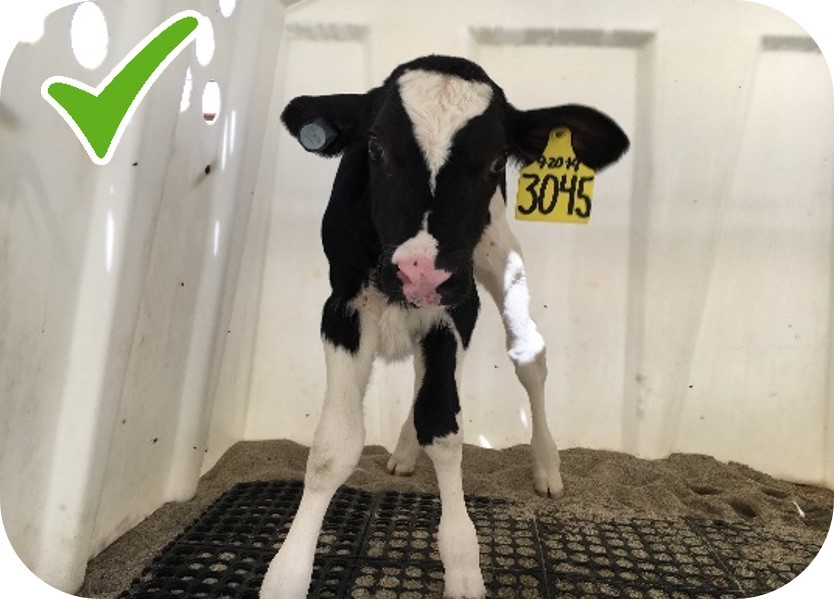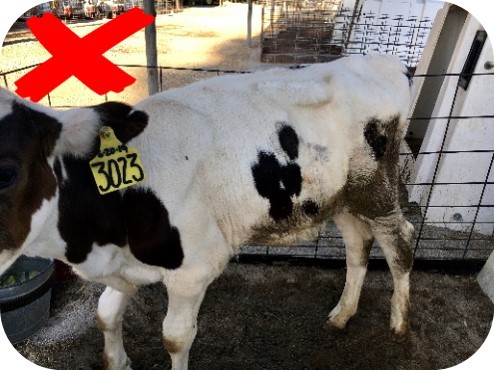Key Considerations for Calf Care
Alycia Drwencke, Dairy Management Specialist
Southwest New York Dairy, Livestock and Field Crops Program
Calf care is one of the most important areas on the farm, but it can also be difficult to prioritize. Particularly, when you consider the labor and financial investment calves can be. However, early life care can influence rate of gain, post weaning health and mortality, reproductive success, milk production, and cull rate. While there are many ways to optimize calf care on the farm, this article will cover just a few of those.
First is providing water for your calves. According to the National Milk FARM Program 4.0, calves 3 days and older must be offered water. While this may be frustrating, there are many benefits to providing young animals water, particularly free-choice water. Research shows that providing free-choice water promotes metabolic function, rumen development, starter intake, average daily gain, and digestion. Calves do not receive adequate water from milk or milk replacer, which can lead to dehydration and negative health effects, strengthening the importance of providing access to water. Keep in mind when you offer water, it should be clean and ideally separate from feed to help keep it clean.
Another important consideration for calves is their bedding. Calves are born with only 2-4% body fat, making them extremely susceptible to weather conditions. Properly bedding can help calves stay warm, dry, and healthy. It is important to select soft material and keep it clean and dry. These materials can include sand, straw, newspaper, rice hulls, shavings, and others. While rocks have been used on some farms for drainage, this is not ideal, as calves lose heat to the rocks, and they can create lesions or injuries. Depending on the season, you may choose to change your bedding material or the frequency of cleaning/adding materials. One way to determine if you current bedding management is working is by using the "knee test." Simply drop to your knees for a minute or two in the calf's pen. When you stand up, if your knees are cold, sore, wet, or dirty, you likely need to add more bedding. You can also evaluate the calves knees and hocks to make sure they are clean, dry, and free of scabs, wounds or missing hair.
Finally, ventilation should be considered for calves year round. The rate of air exchange per hour within a barn should vary throughout the year to be 4 in Winter, 10-20 in Spring and Fall, and 200 during Summer. What that means, is all of the air in your barn should completely turn over 4 times every hour in the Winter. However, calves should not experience wind speeds greater than 60 feet per minute in the Winter. Proper ventilation can help decrease dust build up, moisture, pathogens, risk of pneumonia, and other respiratory disease. While calf care can be difficult to prioritize at times, it is essential to the productivity of your farm and can increase profitability. For additional considerations on calf care, you can contact Alycia Drwencke, Dairy Management Specialist, at 517-416-0386 or amd453@cornell.edu.


Photos courtesy of Blair Downey. The calf on the top has clean, uninjured knees and hocks, supporting that her bedding is clean and dry. The calf in the bottom picture has visibly wet bedding, which is also noticeable when looking at the flank, hocks, and knees of this calf. These areas look both wet and dirty, indicating the need for more clean material.
Upcoming Events
NYSDEC How to Get Certified Course
March 3, 2026 : NYSDEC How to Get Certified Course
Ellicottville, NY
NYSDEC training course in preparation to take the pesticide applicator exam.
From Data to Dollars: Making Data-driven Decisions to Increase Farmers Market Success
March 3, 2026
The Cornell Agricultural Marketing Research Program and Penn State University are excited to present this new, 6-week course as part of Cornell's Farmers Market Research Project. The course is for farmers with experience selling at farmers markets who wish to increase their earnings through management and marketing practices.
Cornell Organic Field Crops & Dairy Conference
March 6, 2026
Waterloo, NY
Farmers, researchers, educators, and agricultural service providers from across the Northeast are invited to the 2026 Cornell Organic Field Crops & Dairy Conference, held Friday, March 6, 2026, from 8:00 a.m. to 4:30 p.m. at the Lux Hotel & Conference Center in Waterloo, N.Y.
Co-hosted by New York Soil Health and Cornell CALS, the annual conference brings together leaders in organic grain, dairy, and livestock systems to share practical tools, new research, and farmer-tested strategies to support resilient and profitable organic production.
Announcements
Cows, Crops & Critters Newsletter Sponsorship
TRYING TO REACH GROWERS AND AGRIBUSINESSES IN OUR SOUTHWEST REGION OF NEW YORK?Weekly Email Update: Shared with 625+ households who have signed up with our program.
Monthly Paper Mailer: To reach our stakeholders and farmers who lack internet access, we send out a monthly mailer where your company's logo and contact information would be featured with a mailing list of 330+ households.
If you sponsor our weekly and monthly publications you reach approximately 955 households.





